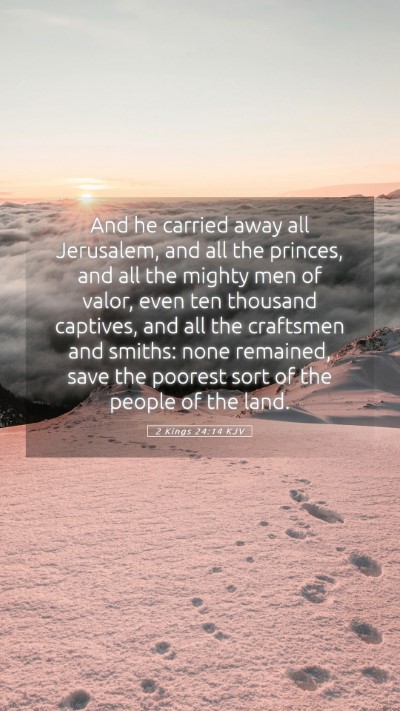Old Testament
Genesis Exodus Leviticus Numbers Deuteronomy Joshua Judges Ruth 1 Samuel 2 Samuel 1 Kings 2 Kings 1 Chronicles 2 Chronicles Ezra Nehemiah Esther Job Psalms Proverbs Ecclesiastes Song of Solomon Isaiah Jeremiah Lamentations Ezekiel Daniel Hosea Joel Amos Obadiah Jonah Micah Nahum Habakkuk Zephaniah Haggai Zechariah Malachi2 Kings 24:14 Meaning
What is the meaning of 2 Kings 24:14?
And he carried away all Jerusalem, and all the princes, and all the mighty men of valor, even ten thousand captives, and all the craftsmen and smiths: none remained, save the poorest sort of the people of the land.
2 Kings 24:14 Bible Verse Meaning
Bible Verse Interpretation: 2 Kings 24:14
Verse: "And he carried away all Jerusalem, and all the princes, and all the mighty men of valour, even ten thousand captives, and all the craftsmen and smiths: none remained, save the poorest sort of the people of the land." (2 Kings 24:14)
Overview
This verse describes a significant moment in the history of Jerusalem, marking a crucial turning point in the Babylonian exile. Understanding this scripture is essential for grasping the broader themes of judgment, exile, and divine sovereignty found in the Old Testament.
In this analysis, we will explore insights from public domain commentaries, including those by Matthew Henry, Albert Barnes, and Adam Clarke, to provide a comprehensive understanding.
Historical Context
The events surrounding 2 Kings 24:14 occur during the reign of King Jehoiachin, a time of great turmoil within the kingdom of Judah. The nation faced judgment for its idolatry and disobedience to God.
Verse Meaning and Commentary
-
Matthew Henry's Commentary:
Matthew Henry emphasizes that the carrying away of captives was a direct consequence of God's judgment. He remarks on the severity of the loss, highlighting how not only were the leaders taken away, but also the skilled craftsmen and valiant men. This act signifies the complete weakening of Jerusalem's societal structure and its vulnerability to oppression.
-
Albert Barnes' Commentary:
Barnes contextualizes the exile within the larger narrative of Israel's unfaithfulness. He notes that the captivity involved a strategic removal of the elite of Jerusalem—illustrating a systematic dismantling of the state's leadership and labor force. This not only served Babylon’s interests but also reflected God's judgment on His people’s sins.
-
Adam Clarke's Commentary:
Clarke points out that the reference to "the poorest sort of the people" indicates that those left behind were the least likely to offer any resistance or rebellion. This detail underscores a theme of desolation and abandonment, yet also hints at the hope of a remnant that God may work with in the future.
Thematic Significance
2 Kings 24:14 encapsulates several important themes that resonate throughout the Bible:
- Divine Judgment: The removal of the people signifies God's response to the persistent idolatry and unfaithfulness of His people.
- Exile and Remnant: The verse sets the stage for the understanding of exile in the Old Testament, serving as a preparation for the eventual return and restoration of Israel.
- Hope Amidst Despair: Though the majority are taken captive, the mention of the poorest indicates that God preserves a remnant for future redemption.
Application for Today
For modern readers, this passage serves as a poignant reminder of the consequences of turning away from God. It encourages a deep self-examination regarding our spiritual lives and a call to fidelity in our relationship with God.
Cross References
- Jeremiah 25:11-12: Prophecy regarding the exile of Judah.
- Ezekiel 12:14: God’s promise of judgment and a remnant.
- 2 Kings 25:11: The continuation of the fall of Jerusalem.
Conclusion
2 Kings 24:14 offers profound insights into the nature of judgment, loyalty, and hope in the midst of loss. By studying this verse and its commentaries, we gain a richer understanding of biblical themes that remain relevant today. For those engaging in bible study, this verse provides a critical tool in understanding the complexities of God's relationship with His people.
Further Reading
For those interested in deepening their understanding of the historical context and spiritual implications of this and related verses, consider participating in bible study groups, accessing bible study resources, and utilizing bible study tools for personal or group exploration.


